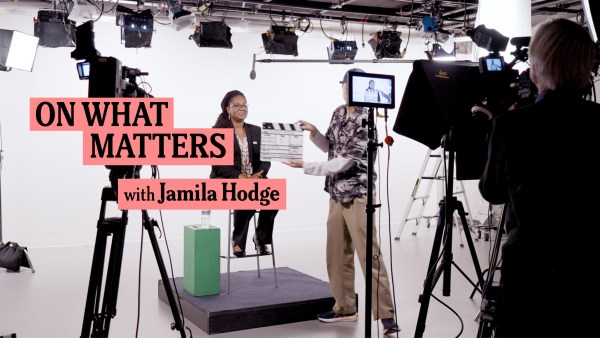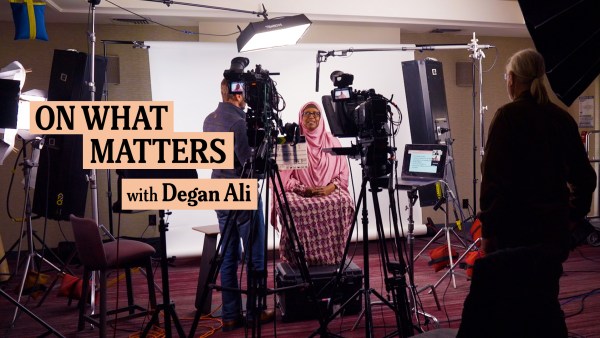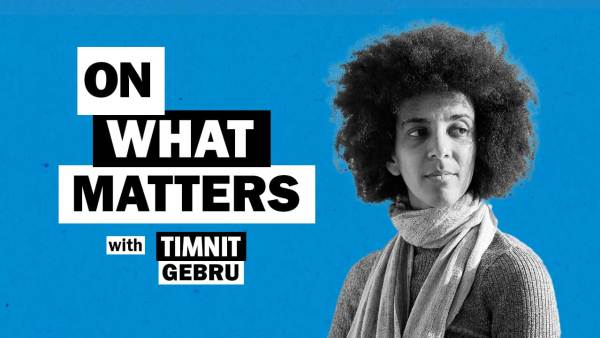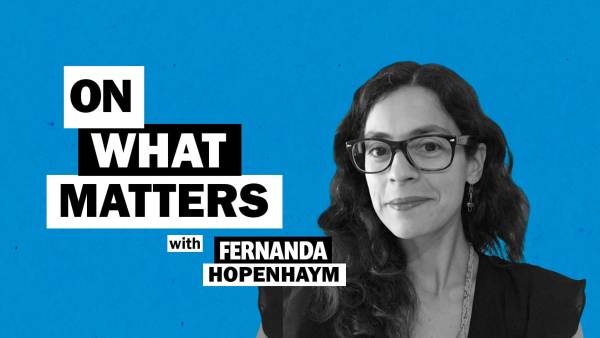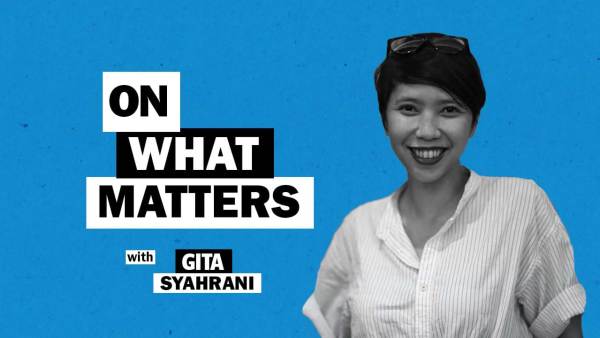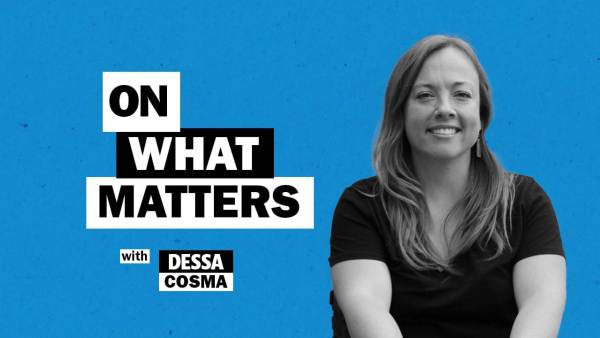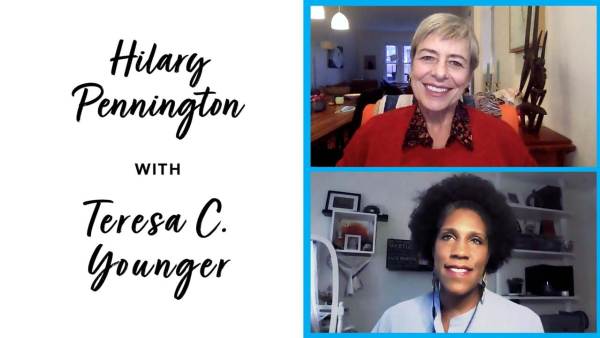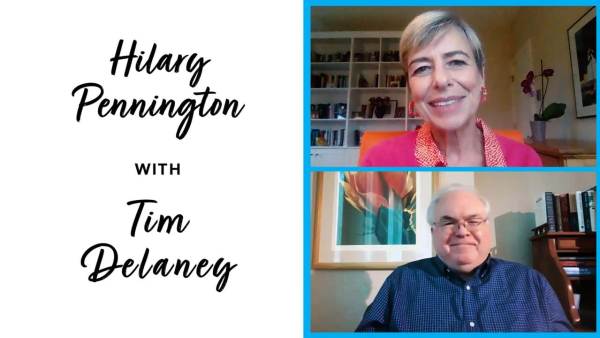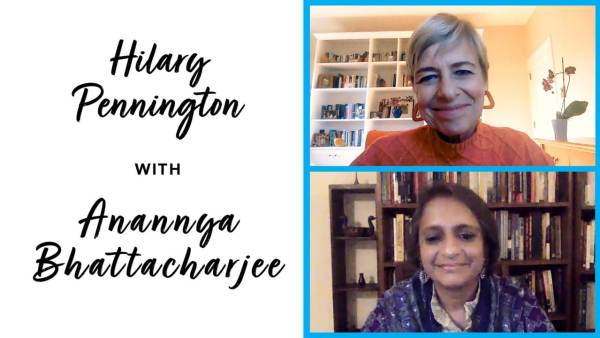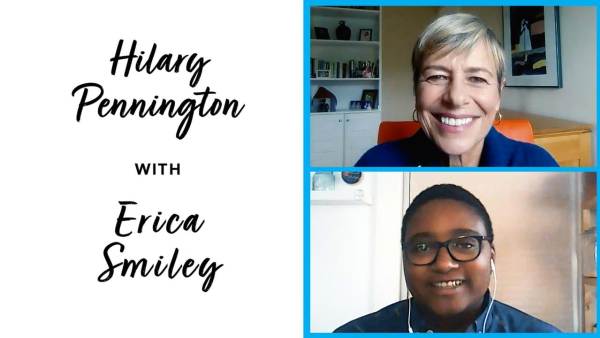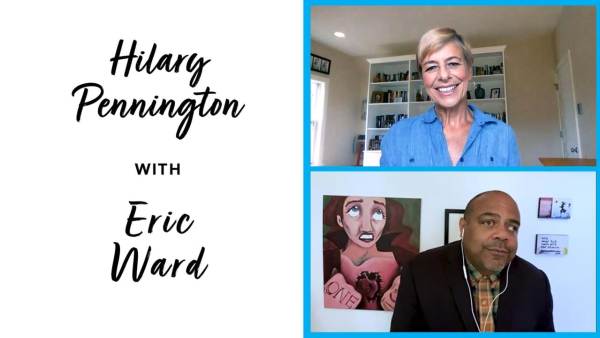Working Towards a Truly Just Energy Transition with Hilary Pennington and Saliem Fakir

Transcript
HILARY PENNINGTON: Hi, I’m Hilary Pennington. Welcome to the sixth conversation in the live series, “On What Matters.” I am so excited today to be talking with Saliem Fakir, who leads the African Climate Foundation. And we’re going to get into the conversation, but first, let us bo th introduce ourselves. I serve as the executive vice president of programs for the Ford Foundation. I’m a middle-aged white woman with very short blond hair. I’m wearing a navy sweater and sitting in front of a white wall. And Saliem, let’s turn to you to introduce yourself.
SALIEM FAKIR: I’m Saliem Fakir, the executive director of the African Climate Foundation. I have black hair, I’m middle-aged, and a person of color. I have a white wall behind me, and I’m wearing a black jacket. And it’s really wonderful, again, to be on the show. So thanks.
HILARY PENNINGTON: Well, we have a lot to talk about, but we’re going to start out with just a short video that will give people who are listening a sense of the work that you do, Saliem. So let’s roll that video, and then we’ll start.
[The African Climate Foundation. Simple animated graphics support the narrative throughout this video.]
NARRATOR: The African Climate Foundation is the first and only African-led climate change regranting organization on the continent. As an African-led, African-based, and fully African-run organization, we support local solutions to Africa’s climate change and development challenges. We envision a vibrant and climate-resilient Africa, in which inclusive socioeconomic development delivers sustainable and equitable growth. And we work to support interventions at the nexus of climate change and development that will deliver long term socioeconomic transformation and inclusive development on the African continent. We focus on supporting transitions in three key sectors, namely: energy, land use and agriculture, and cities. We also work on interventions that traverse these sectors, such as finance, digitization, infrastructure, industrialization, geopolitics, climate diplomacy, human rights, climate justice, gender, youth, health, and education. Through a combination of grantmaking, fellowships, research, technical assistance, coalition building, and targeted advocacy and multi-stakeholder convenings, we support a range of interventions across our programs. We believe that change cannot be brought about by one party acting alone. We actively pursue, support, and foster strong partnerships and platforms for collaboration. Our work seeks to confront and respond to the disconnect between climate change and development planning in Africa and demonstrate the alternatives to existing practices that can avoid long-term economic risks, through new climate resilient development pathways. And support the development of robust multidisciplinary evidence to inform better decision-making by social partners, regional institutions, and governments. Our goal is to support African agency at all levels, from government to civil society to communities. We have built strong capacity, which has enabled us to significantly increase our grantmaking throughout Africa. A key priority for the ACF is to ensure that our work has reach across the African continent. To achieve this, we seek to ensure that African countries are covered by either our grants, or by staff representation. And we work to maintain strong relationships with key regional institutions. Our work seeks to bring real economic solutions and to strengthen African agency. The work of the ACF would not be possible without generous support from—and partnerships with—philanthropies.
[The African Climate Foundation. To learn more about our work, visit our website. www.africanclimatefoundation.org]
HILARY PENNINGTON: Saliem, one reason I love talking to you is that you are hopeful that we actually can secure the future of the planet. And you have so many ideas about sustainable development. And another thing I love is that you don’t talk about a clean energy transition. You talk about a just energy transition. So, can we start with that? Can you talk a little bit about what just energy transition means to you and what it should mean to others. And in particular, the justice aspect of it, and how it connects to broader justice aspirations for society.
SALIEM FAKIR: So, Hilary, before I answer your question, I thought maybe I’ll explain a little bit about the African Climate Foundation. It’s a very new foundation that was set up on the 1st of April, 2020, and I’m very glad to say that since last week, the 1st of April, this is our third year. And we’ve taken a conscious decision when we started to say that the narrative around climate has largely been not really filtered through the right lens. And what we wanted to build is sort of a conclusion of our strategic focus, around what we call a “climate and development nexus.” And embedded in that, we are very interested in aspects such as social justice. We are arguing that climate risk—ultimately, even climate opportunities or investment, ultimately—their success is not so much determined by how much we only just deal with the effects of climate change, or for that matter, how much greenhouse gas we reduce, but really about how we build a more wholesome, economic, resilient model on the back of these climate risk interventions that we want to mitigate against, and also the opportunities in investment in climate space. And I will come to some of that later. And why we say economic resilience—because that is really the core at the heart of what is needed on the continent. We need the right type of growth, with the right distributional effects, and we will only know if we succeeded with economic resilience and economic development and growth; if there is a strong feature of social justice and social benefits to communities at large and individuals at large. And that is really what we think should be the bedrock of all the climate solutions that we are seeking on the continent. It’s not the other way around.
HILARY PENNINGTON: I love that. Well, so let’s stay with that for a minute. You know, if the aspiration is for development that can also produce inclusion—and the thriving of communities on the continent—what are some of the critical building blocks that you see, I mean, in terms of policy or technology or development priorities, that would help produce this equitable growth?
SALIEM FAKIR: For example, in South Africa, we are faced with a situation of whether the route towards dependency on coal will produce the best social and economic outcomes for the country. So on the one hand, South Africa’s coal dependency is very high. We have one rank, somewhere around in the 20th highest emitters in the world. We will be faced with challenges around our carbon intensity in the future, especially if countries adopt more punitive measures against imports that are coming from coal-intensive, coal-dependent economies. And coal, in general, is on a decline. And if we look at the performance of our coal plants, particularly the new coal plants, the energy cost from coal electrification is very high. So they are going up, because the true cost cannot be transferred to consumers. So there are certain cost recoveries that cannot be made, because the whole system itself requires reform, and we need to widen the energy mix. South Africa also has the energy crisis, which is hammering the economy, and the quickest way to solve that is to set objectives—around our emissions, our lowering the price of electricity in the future, and also reducing energy security, which is affecting livelihoods and it’s affecting jobs. And it’s also costing consumers, not only through load-shedding, which is the term we use, but also through higher prices that they have to pay from their salaries, particularly poorer communities. If we can find solutions, such as new technologies, particularly renewables, wind and solar, that are mature at a much cheaper cost, if we can diversify from coal and reduce coal, for example, generate electricity from coal from 90% to, let’s say, even half that, or even much lower than that, with cheaper cost energy, we will, effectively—what technically is called bring the price path much lower in the future, rather than going up. So we are protecting jobs in the long run through a number of mechanisms. One, through less inflationary energy costs. And you can see that, for example, in Europe with the Ukraine war: Energy prices have gone up because of the high cost of gas. That has major social effects and also affects jobs. The second part is that the second way to protect our economy is by ensuring that any goods that we manufacture, in a country that is highly industrialized and very export-dependent, that we are not, in the future, penalized by carbon border tariffs that would be imposed on goods that are imported from South Africa. That could be steel, it could be cement, it could be all kinds of things. That is dependent on electricity or energy sources that are carbon-intense.
HILARY PENNINGTON: I love that you refuse that kind of false trade-off, that, you know, you can’t have jobs and development, and at the same time, protect the environment. But I’m curious, you know, because that is a very well established sort of narrative. Right? Who is it harder to convince to change their minds on that subject: policymakers or the public?
SALIEM FAKIR: For example, in South Africa, the case is very clear. We need to diversify, because we’ve got absolutely no option. But you find that even in the policy-making setting, there are these divisions in the decision-making space. One view is that we must go in the direction towards cheaper energy sources and cleaner energy sources, if you want to put it that way. Others are saying, well, you know, we’ve just handed a lot of coal interests to new economic interests in the economy. They have a lifespan of 20, 30 years. It’s an indigenous resource. If you have renewables, you have to import the technology. Why not use our coal and keep going? On consumers, I don’t think that argument should be made just on the basis of climate. It should be made on the basis of how much they will save in income if we made the right decision in terms of our diversification of energy mix. And we are able to prove to them that this is not only a way to protect their income, because inflation eats away income, it destroys income, which means that people who are affected by inflation are actually getting poorer. Secondly, it says to them that through rapidly mobilizing more suitable technologies that are sort of aligned to less constraints and can be built as we need, we are reducing energy, we are improving energy security and, with that, we can actually grow the economy. And thirdly, I think we are saying that by making the South African economy, or any economy that is fossil fuel dependent,—we can also look at Nigeria and other countries—by making them fit for purpose for where the world is moving, in terms of decarbonization, we are providing political leadership and economic leadership to respond to changes in the world that in the long run will affect us. So, for example, if you took high gas dependency in Europe—particularly Germany, that was highly dependent on piped gas from Russia—suddenly the geopolitical relationship changes. Germany has to spend a lot more money to look for new sources of gas from elsewhere, which means that it has not tailored its economy strategically to respond to a crisis like it just had about two years ago with the Ukraine crisis. So we must be able to be agile economies. And the only way we can do that is building more resilient energy systems that can respond to a number of things. In this case, the cost of energy, energy security, and penalties that we could face because the world is increasingly being decarbonized. And, you know, if we don’t adjust to that, there’s impacts on the economy down the line.
HILARY PENNINGTON: Yes, huge impacts. Well, I love that you make the connection to people’s pocketbooks, right? Not just their jobs, but the everyday average consumer who may not work in the energy industry, who clearly is affected by all of these kinds of costs. And that does seem to be something that is beginning to shift and may, in the end, build the kind of political pressure that’s necessary to support the sorts of policies that you’re talking about. And, you know, just staying with this, because I think one of the great benefits of having a dedicated, only three-year-old African Climate Foundation, is that you are able to put new ideas out into this space, and to get people thinking and working in a different way. Let’s talk a little bit about just a couple of things that you’re the most proud of, that you have been able to do in your very, very short history.
SALIEM FAKIR: One of the things that we did, and it’s now becoming a model for linking nationally determined ambition, which is around, in this case, emission reduction to a stronger investment program, and new kinds of infrastructure, and being able to then gain global support through cheaper sources of finance. In this case, climate finance is the achievement of the Just Energy Transition Partnership deal that was agreed to by South Africa in the COP26 in Glasgow, where philanthropies like ourselves, and others as well, played a big role in developing, I think, a very pioneering model, which has never been done before anywhere in the world, grown and developed indigenously within South Africa. A prime to post-recovery program that is part of the economic development agenda of South Africa. But at the same time, solving South Africa’s climate ambitions and being able to unlock huge amounts of funding. In this case, $8.5 billion dollars..
HILARY PENNINGTON: Say the amount again?
SALIEM FAKIR: $8.5 billion dollars.
HILARY PENNINGTON: Yes.
SALIEM FAKIR: That was raised. And it’s a deal that is now—basically—the pledges and the agreements have been secured. Some of the money is flowing, and the rest will come, based on the role out and execution and operationalization of an investment plan. We’re finding that countries like Indonesia have just adopted a similar thing. And Vietnam and Nigeria and Senegal are looking into this and, potentially, what they call a kind of mini JETP in Egypt. It doesn’t have to—most of these are aimed at displacing fossil fuels with a program of investment into clean energy solutions that are supported by the international community. But one element of it that I think is unique to South Africa, which we would like to see work in Indonesia and Vietnam, is a very strong feature of the just aspect of those energy transitions. It’s very germane in South Africa. In fact, the concept of the just transition comes from the workers movement, particularly the International Labor Organization. And in the 1970s, the US workers recognized that new environmental standards and programs and new environmental enforcements—would lead to potential job losses in sectors that were polluting chemical industries and so on. And they were proactive in looking at ways in which to support workers that could be affected by this. So if we’re looking at, for example, displacing coal, or oil, or gas, anywhere else in the world, there are lots of people that are highly dependent on those industries, not for direct jobs only, but also indirect. And remember, those industries are located in particular geographies that are critical to those local municipalities and local economies. So whole communities are affected by it. It’s a bit like mining, I know the Ford Foundation is doing a lot of work on mining. If you took out the mining and you didn’t replace it with something more viable in the long term, you know, you do a lot of harm to people that have been dependent on those industries for 20, 30, maybe even 50 years, and suddenly you’ve just created a vacuum. So these transitions have to be more. So one of the purposes of the just transition is to look at energy transitions without just being fixated on the finance and investment side, and also just the technology solutions, but also the just aspects. What does it mean for local economies? What does it mean for household incomes? What does it mean for the development models, future development models? But even in South Africa, for the coal mining areas, where coal has been the pivot and the anchor of those economies, now you’re taking it out, you’re creating a vacuum; what would you replace it with? So there’s a responsibility. Remember, a lot of extractive industries, often there is some local benefit, but the larger portion of the benefit actually happens in the global sphere and the national sphere. Much of the royalties and the financial benefits of many other things—they happen in the economic hubs, not necessarily in local areas. So we have a national responsibility, moral, ethical responsibility, to make sure those—what we’re displacing is replaced with something better and improves the wellbeing of those people. This is where, I think, the just aspects of the transition, actually for a long time, that has been missing from the climate debate, brings the development aspects much closer than they were before. And it’s becoming less of just an environmental issue, but it’s becoming an issue about the future of economic development, the future of economic models, new kinds of inclusive economies. That’s the debate that we are steering outstate as a result of the work we’re doing on the just transition.
HILARY PENNINGTON: I think that’s such a hugely important addition. You know, I mean, these industries are not—they are extractive in many, many ways, right? And I think until there are concrete ideas and examples, where we can see that communities that everyone thinks stand to lose, can actually be protected, and help to make the transition, that’s essential to get where we want to go. And you know you have, Saliem—we’re going to go to audience questions, because we have so many people who want to hear more from you. But before we do that, I just want to ask you the question I always close with. And you almost, in a way, have begun to answer it. But just, you know, if you were to say one thing that gives you hope, given the complexity of what you work on, what would that one thing be?
SALIEM FAKIR: My view on climate is that you must take a more enlightened view, a more eclectic view. Use the debate to open up new avenues and vistas of discussion around what the nature of our economies are in Africa. And many of them are enclave economies with very little interconnection with the rest of the economy. In fact, if you analyze a lot of economic literature, they will show you maps of Africa, in which it’s basically, you know, infrastructure built around the mine. Go to a port and everywhere else there’s very little other types of infrastructure developed. So I think what we are saying in our work is: Those enclave economies are not viable. They’re actually responsible for a lack of economic resilience. They are, actually, the root cause of why we have such high levels of climate vulnerability on the part of the continent. And secondly, they are forfeiting our ability to invest in new technologies that would modernize, at the same time, both decarbonize our economy and take us away from an enclave model to investing in other components of the economy in order to diversify. We need a lot more manufacturing. We need a lot more tradable services. Not just services, which are just based on consumption, but services that require integration of electricity, digitization, and the better use of our human talent on the continent. That this talent is better integrated into the regional and global economy. For now, regional trade is very poor on the continent. We take a lot of raw material. We export it. We bring it back at a higher cost. This is not a very sustainable way to deal with our economies in the long term, and we maintain at ACF, if we can build more inclusive, diversified economies, we will also make our economies more resilient to climate change, because we’ll have the resources in government and elsewhere in society through higher income. And secondly, we are able to take opportunities like new technology waves—whether it’s electric vehicles, renewables, battery technologies, green hydrogen—and build these into our economies. That they make us far more healthier and resilient in the longer term and improve human wellbeing. The last thing I want to say is, because we have enclave economies, we don’t put enough emphasis on human talent and capital on the continent. And the way to unlock that is through improving electricity access and cheaper sources of electrification, because it will enable a lot of other things in the urban sector, you know, integration of digital and other forms of entrepreneurship to be built around improved electrification. That’s the vision we have.
HILARY PENNINGTON: Thank you for that. That is such a strategic and coherent vision. So we have time for only a couple of audience questions. The first one we have is from Aguil, and the question reads, “We know there’s misinformation/disinformation about South Africa’s JETP Just Energy Transition Plan, especially in the midst of increased rolling blackouts.” And that’s what you mean when you say load-sharing. And actually the result of that is blackouts across South Africa. “What can be done to counter this misinformation and ensure that the just part of the transition plan is centered?”
SALIEM FAKIR: The thing is that there’s a number of levels. One is, I think, the government needs to communicate its decisions on the JETP and its information and engagement needs to improve. And I can tell you, they’re fully aware of this. In fact, the new project management unit has been set up to implement the JETP, and through the Presidential Climate Commission, are looking to improve engagement with different stakeholders. They started that process early last year, but it needs to work. We ourselves as ACF, we’re investing strategically in a lot of key media to improve communication, not only on the just transition, and not only JETP, but also look to increase accountability and transparency on what companies are doing. Not just coal companies, by the way, but also green energy companies that are investing. They also need to do a lot more around the just transition. They are benefiting hugely from this new policy shift, but are not actually improving the just transition dividend, and we are seeing lots of gaps there that we need to address.
HILARY PENNINGTON: Well, I think that that kind of communication is so important to keep the public with you. You know, when they are suffering blackouts on a weekly basis. So I’m going to turn to the next question, which is from Liz M., and that is, “What is philanthropy’s role in achieving a just transition, given the competing priorities and agendas of stakeholders. Are the current commitments from philanthropy enough, and what more is needed?”
SALIEM FAKIR: I would say, you know, to Liz that we have very low investment from philanthropy on climate and development issues. In fact, the figure that was put up by Climate Works Foundation is around 2%. It might have increased because of ACF, but probably not very high, probably 3 to 4%. But philanthropy has a huge role, and we’ve shown that if you take a more holistic, integrated model of linking climate with development, you can make the relevance a lot more clear. And the power of philanthropy is that it doesn’t have the billions of dollars, but it has the sufficient resources to create the enabling conditions for those billions of dollars to be used in ways that can mold, deal with climate risk, and climate vulnerability, and climate investments, and create new opportunities. But you have to take an integrated approach, build the right ecosystem that can drive that, and use our money, which is highly flexible, fairly easy to access if you make the right arguments and alignment with the right strategies, and be able to move it at much greater speed than usual development finance institution and bilateral funders.
HILARY PENNINGTON: That’s a huge asset. So our last question is from Stefan, “How does South Africa’s JETP think about addressing inequalities that might emerge in coal-producing geographies as a result of transitions to renewable energy? For example, might inequalities emerge between the coal-producing east and the renewable-producing west of South Africa? And if so, are there strategies to minimize the effects of deindustrialization in the affected communities?”
SALIEM FAKIR: So the best way to think of the just energy transition is two levels: One is very specifically focused on the just aspects of the energy transition, particularly the coal mining areas. And we have to align that with a much broader development model that goes beyond just the energy sector. The energy sector alone won’t solve the broader development needs and there are some really big challenges there. We shouldn’t just focus on renewables but actually look at other development opportunities, particularly in land use, agriculture, and do some really novel stuff. And the second part is to hold a bigger picture that the just aspect is much broader than just a particular geography and an energy technology or energy carrier. In this case, coal was switching to renewables. It is the just transition out of coal into clean energy. But we must take a more macroeconomic view and say, “How do we ensure distribution, redistribution, and the kind of fiscal support that is necessary to develop broadly our economy as a whole?” And also ensure that geographies that are going to benefit that we have—we can also ensure in the coal mining areas that, even though it’s not linked to the energy sector, we can at least substitute with jobs or better economic opportunities. Ensuring fair wages, decent jobs, and more holistic livelihoods and welfare in those areas. I do think that South Africa is an unequal society. So when we look at just transition, we have to locate it within the broader spectrum of inequality, and say that we have a duty to fix not only the broader macroeconomic issues, but also, within specific localities that are going to be impacted by energy transitions as we switch to new technologies.
HILARY PENNINGTON: Well, you know, I love that you joined back where you began with the relationship between workers rights, workers visions, and a broader and more inclusive economy, with what it means to move towards a just energy transition. Saliem, you know, thank you for your really visionary and practical work and for a wonderful and inspiring conversation. And thank you to everyone who has joined us to hear it. We are really grateful for your time and your attention. Thank you.
Accessibility Statement
- All videos produced by the Ford Foundation since 2020 include captions and downloadable transcripts. For videos where visuals require additional understanding, we offer audio-described versions.
- We are continuing to make videos produced prior to 2020 accessible.
- Videos from third-party sources (those not produced by the Ford Foundation) may not have captions, accessible transcripts, or audio descriptions.
- To improve accessibility beyond our site, we’ve created a free video accessibility WordPress plug-in.

Welcome to “On What Matters,” a conversation series between our executive vice president Hilary Pennington and social justice leaders on the frontlines of change.
This episode features Saliem Fakir, the founder and executive director of the African Climate Foundation, the first grantmaking foundation in Africa focused on furthering solutions for sustainable climate development.
In this episode, Hilary and Saliem discuss the urgent need to address climate change and how South Africa’s promising Just Energy Transition Partnership, which aims to shift the country from coal to renewable power, may offer lessons on what it will take for South Africa—and the rest of the world—to successfully make a just energy transition.
Learn more about ACF at: https://africanclimatefoundation.org/
